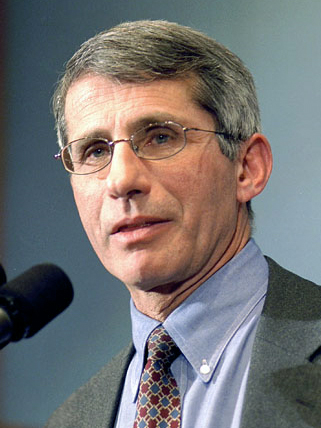The AIDS epidemic is one of the greatest challenges to our society today. It is a fight that we cannot afford to lose.

"Anthony Stephen "Tony" Fauci" is an Immunology/immunologist who has made substantial contributions to HIV/AIDS research and other immunodeficiencies, both as a scientist and as the head of the National Institute of Allergy and Infectious Diseases (NIAID).
More Anthony S. Fauci on Wikipedia.The good news is that we have a vaccine that can induce an immune response. But the sobering news is . . . we have a long way to go.
Many vaccines in use today resulted from both government-sponsored and private research.
It selects the virus to try and escape from the drugs by becoming resistant. That's a natural thing that any microbe does when you treat it.
The older you get, the greater the probability that you would not only have serious complications, but you would actually die.
We can never be totally 100 percent prepared. But we're making extraordinary progress over the past year.
We're aiming at 20-million doses of a pre-pandemic vaccine but to develop the capacity to be able to make 300-million doses within six months of when we ultimately get the latest version of it that is the real killer.
I think there was always rather intense interest at the level of the [HHS] department. Influenza has always been at the very top of my short list of things to be concerned about.
Every day there's another country. It's going to go all the way across, there's no doubt about it.
This disproportionate burden of HIV/AIDS makes it imperative to increase awareness and mobilize Black communities to get involved in the struggle against this disease.
A sobering finding ... it tells us you still have to worry about this, but you have to worry about something else too, because somehow, somewhere, the virus is coming from a place that we haven't yet identified.
The models show that if you combine well-directed, targeted treatment with some social interventions like closing schools, ideally together with some vaccination, it's conceivable you'd be able to stop the epidemic.
Currently the world capability is somewhere less than 500 million doses of vaccine with, you know, close to 6 billion people in the world. In addition, the dose that's required to induce an immune response with this particular vaccine is a significantly higher dose than the dose that you use to protect against the standard run-of-the-mill seasonal flu.
It is unclear whether the mutation occurred in the person or whether it occurred in the chicken.
You have to prepare for the worst, but it's entirely conceivable that we could have a moderate one. You have to prepare for a horrendous problem, but the general public shouldn't assume that we're going to see the worst case.
It isn't an absolute, but you certainly can say that the chances of containing spread among bird flocks in developed nations that have good agricultural capabilities and controls, to identify rapidly and cull and eliminate the sick chickens to prevent spread . . . is much better than in some other developing nations.
Luckily, those two factors will neutralize each other.
Not to prepare for the worst-case scenario would be completely irresponsible.
Would it be the best thing that we spend money to have a vaccine for pandemic flu that never happened? ... That would be a great outcome as far as I'm concerned.
Simply put, to end the AIDS epidemic in the United States, we need to mobilize efforts in all our communities to combat HIV/AIDS and to coordinate these initiatives with research institutions, pharmaceutical companies, national organizations and local community and church groups.
As we build up our capacity to respond to seasonal influenza, it will put us in good stead.
The findings may point the way to new medical interventions, such as drugs or vaccines, for infections caused by enveloped RNA viruses.
There is the possibility, if not likelihood, that we would not yet be finished with this, even with the cases no longer spread in this season or at this particular time, ... So we must be prepared for serious consequences in future years.
It's been over 30 years since we've had a pandemic, so inevitably we are going to have a pandemic within a reasonable period of time.
The ultimate expense for any given country naturally would be considerably less than if you had to have a regimen in which you gave the drug every day.
I don't think that the resources of the western European countries are going to implode because of this. But you see disaster striking, economically and otherwise, when you get into countries such as in Africa and other developing nations in which they don't have the resources to handle this.
Copyright © 2024 Electric Goat Media. All Rights Reserved.